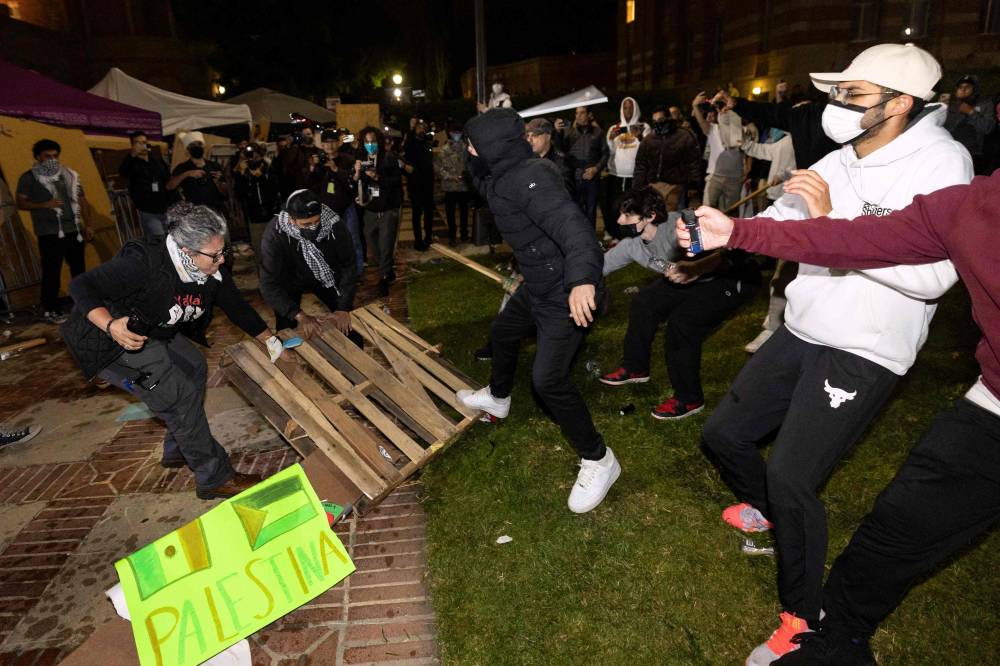Unrest at UCLA: What we know
Video footage shows the camp under siege from dozens of masked and hooded people who appear to be trying to break down barricades.

LOS ANGELES - Violence flared at the University of California, Los Angeles, overnight as counter-protesters clashed with pro-Palestinian demonstrators who have occupied parts of the campus for days.
Here's what we know about the unrest:
What happened?
A largely peaceful pro-Palestinian encampment established at UCLA last week appears to have been attacked by counter-demonstrators some time before midnight on Tuesday.
Video footage shows the camp under siege from dozens of masked and hooded people who appear to be trying to break down barricades.
Several of them are wielding long sticks, and at least one person inside the camp is hit over the head with an audible crack before falling to the ground.
Some kind of substance appears to be sprayed in both directions.
The Daily Bruin, the campus newspaper, reported that counter demonstrators used tear gas.
Fireworks were seen being launched into the camp and exploding.
"Pepper spray, mace, boards, bricks, fireworks, not firecrackers -- fireworks were shot directly at students and exploded at ground level inside the encampment," Vincent Doehr, a UCLA political science PhD student and Encampment Media Liaison, told CNN.
The unrest appears to have lasted several hours.
Paramedics said one man in his mid-20s was taken to hospital for a head injury.
What was the official response?
Journalists who were present noted security forces were on campus, but initially did not intervene.
The Daily Bruin quoted UCLA Police Chief John Thomas as saying five or six officers were on duty at the time, but left after coming under attack while trying to help an injured person.
An AFP journalist on site said police officers arrived around two hours after clashes erupted, but did not move in right away.
Police officers in riot gear eventually separated the sides around 3am, pushing counter-protesters back.
On Wednesday, California Governor Gavin Newsom said he wanted to know why law enforcement had not acted sooner to quell the violence.
"The limited and delayed campus law enforcement response at UCLA last night was unacceptable and it demands answers," he said.
A spokesman for the LAPD said he did not know if any arrests had been made, and referred AFP to the campus police who were not immediately reachable.
"Where were the authorities? Where were the campus security that were there during the day?" said Mark Torre, a 22-year-old student who was not involved in the encampment or counter-protests.
"The extent to which these clashes lasted shouldn't be acceptable on any campus."
UCLA's Chancellor Gene Block on Wednesday said it had been an "appalling assault."
"However one feels about the encampment, this attack on our students, faculty and community members was utterly unacceptable," he wrote.
"No one at this university should have to encounter such violence."
He pledged a "thorough investigation that may lead to arrests, expulsions and dismissals," and said the university would also be "carefully examining our own security processes."
Who were the counter-protesters?
Witnesses said some of the protesters were carrying Israeli flags, but that they did not appear to be students, and said many of them had been on campus on several occasions.
The encampment was attacked "by a group of violent agitators," Kaia Shah, a 23 year-old political science post-graduate researcher who was in the encampment told AFP.
"I don't even think it's appropriate to call them counter-protesters anymore because they are not protesting, they come here in a mob-like fashion and violently harass us."
Daniel Harris, a 23-year-old jazz student, told AFP the hooded and masked attackers appeared to be "in the 20- to 35-year-old range and didn't look like students or people that had anything to do with the university."
"I know Jewish students who are in support of Israel and I didn't see any of them there," he said.
Assistant professor Elizabeth O'Brien said she had seen "outside agitators" chanting slogans like "USA, USA" and "Fake News" and initiating the violence.
"I saw middle-aged men attacking young students hiding behind umbrellas," she said. "The students absolutely did not initiate any attack."
What is happening on campus now?
There was relative calm on the campus on Wednesday, journalists reported, with a visible police presence.
Students inside the encampment were rallying, with announcements on a loudspeaker.
Over 100 tents remained, blocking the main entrance to Royce Hall, whose neo-Roman architecture had been defaced with the words "Free Gaza."
But there were no classes "due to the distress caused by the violence that took place on Royce Quad late last night and early this morning," the university posted on social media. - AFP









